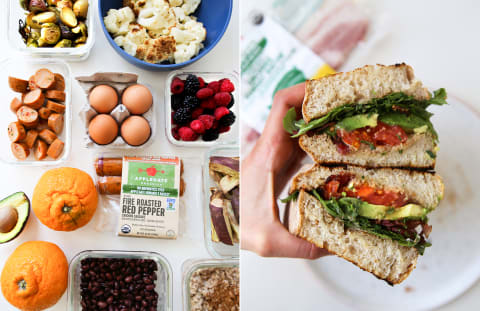As a nutritionist and a newly minted physician assistant (!), I spend a lot of time thinking about how food plays a role not just in our health, but in medicine and assisting in the treatment of chronic disease. So it’s impossible to ignore the way in which food gets to the plate—the journey, evolution, and life cycle of a product, truly from farm to table. They say that an apple a day keeps the doctor away, but I’d like to rephrase it to, “Being an Applegatarian makes this nutritionist say hooray!” It’s been a slow and steady process on how I can do my part to be both nutritionally and environmentally conscious holistically in my life, but one that I’m proud of seeing the progress. Here are some doable ways that I’ve been more mindful about practicing for sustainable living and nutrition: I love prepping a variety of roasted vegetables for the week, as well as some snack bites and dips. I can then pair them with Applegate Organics® Fire Roasted Red Pepper Chicken Sausage or Applegate Organics® Oven Roasted Turkey Breast roll-ups for a quick lunch on the go! Which is why I’m thrilled to pick up a package of Applegate Organics® Turkey Burger to make burgers with sweet potato fries on the weekend. Or roasting up some bacon to have for brunch or toss in a BLT sandwich! At the end of the day, while food is what got me started in my profession, it isn’t my focal point. It’s one piece to the puzzle of well-being: To me, food serves as nourishing and energizing fuel to make me feel my best, so that I can then go out and act and perform at my most optimal potential and capacity—for myself, for others, for my community, and for the environment. *Ethical: Animals raised with no antibiotics ever or growth promotants, on vegetarian feed with no animal by products (beef is 100% grass-fed) and with space to engage in natural behaviors and promote natural growth. **Environmentally responsible: Applegate requires all animals to be raised without antibiotics. Applegate is committed to advancing agriculture and processing systems like organic, non-GMO and regenerative farming.




